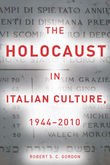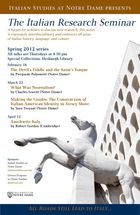The Italian Research Seminar

Auschwitz-Italy
Thursday, April 12 at 4:30pm in Special Collections in the Hesburgh Library
This lecture sets out to explore certain aspects of Italy's complicated and often contradictory responses to the Holocaust over the long postwar era. It does so by way of posing a simple set of questions: when, how and why did the word Auschwitz, and the place it designates, become part and parcel of Italian culture and language?

Robert Gordon, Professor of Modern Italian Culture at Cambridge University, has published widely on 20th-century Italian literature, cinema and cultural history. He is the author or editor of several books on the work of Primo Levi, including Primo Levi's Ordinary Virtues, Auschwitz Report, and The Cambridge Companion to Primo Levi. He is co-editor of Culture, Censorship and the State in 20th-Century Italy and his study of cultural responses to the Holocaust in Italy will appear in June 2012. His work on cinema includes the books Pasolini. Forms of Subjectivity and Bicycle Thieves, DVD and blu-ray audio commentaries on Pasolini's Teorema and Bicycle Thieves, and articles and essays on Holocaust cinema, early film and literature, 'Hollywood on the Tiber', and censorship.

Professor Gordon's latest book, The Holocaust in Italian Culture, 1944–2010, is the first major study of how postwar Italy confronted, or failed to confront, the Holocaust. Fascist Italy was the model for Nazi Germany, and Mussolini was Hitler's prime ally in the Second World War. But Italy also became a theater of war and a victim of Nazi persecution after 1943, as resistance, collaboration, and civil war raged. Many thousands of Italians—Jews and others—were deported to concentration camps throughout Europe. After the war, Italian culture produced a rich array of stories, images, and debate through which it came to terms with the Holocaust's difficult legacy. Gordon probes a rich range of cultural material as he paints a picture of this shared encounter with the darkest moment of twentieth-century history. His book probes aspects of Italian national identity and memory, offering a new model for analyzing the interactions between national and international images of the Holocaust.

The Italian Research Seminar, jointly organized by the Devers Program in Dante Studies and by Italian Studies at Notre Dame, aims to provide a regular forum for faculty, postdoctoral scholars, graduate students, and colleagues from other universities to present and discuss their current research. The Seminar is vigorously interdisciplinary, and embraces all areas of Italian history, language, and culture (from literature to film, from art history to music, and from anthropology to architecture), as well as perceptions of Italy, its achievements and its peoples in other national and international cultures. The Seminar constitutes an important element in the effort by Notre Dame’s community of Italianists to promote the study of Italy and to serve as a strategic point of contact for all Italianists.